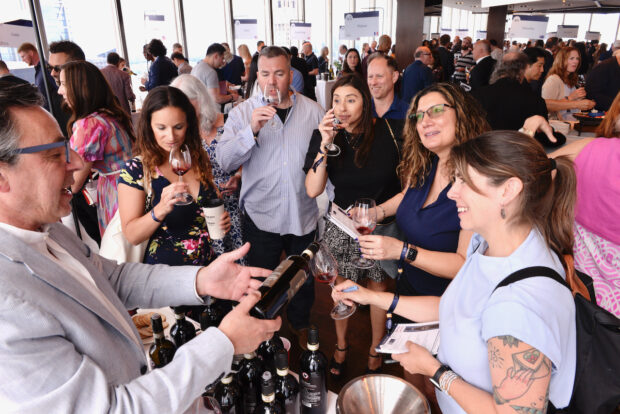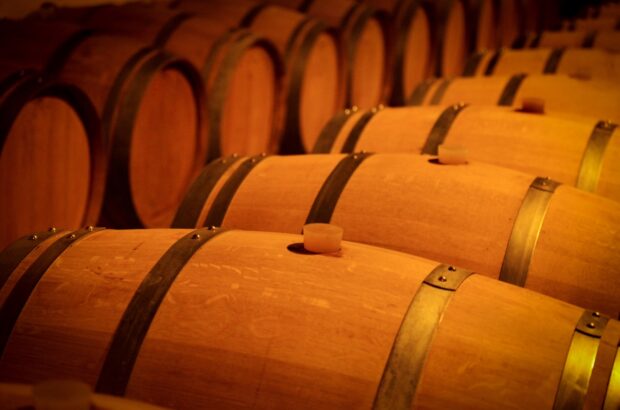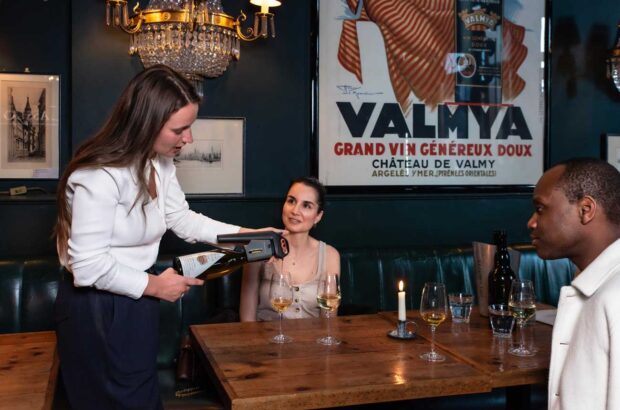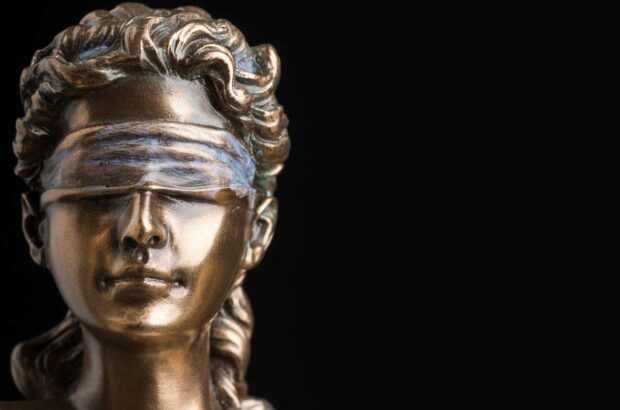It is in many ways thanks to Len Evans that Australia is now a nation of food and wine lovers, writes ROSI HANSON.
Twice last year Len Evans AO OBE was asked to write his memoirs. He refused, since he was still living them. Born in 1930, Len Evans has made the pursuit of the good things in life, especially wine and food, into an art form as well as his profession.
His contribution to the development of the Australian wine industry is huge. He has also run restaurants, and written cookbooks and a national column entitled ‘Indulgence’. His wife Trish, who Len calls the Commissioner of Food Police, battles to curb his continuing zest for gastronomy in the interests of health.
In the late 1950s, after marriage to Trish, Len Evans started collecting wine and drinking it regularly at home. ‘We were poor but selective,’ he remembers. First food memories, growing up in England, were of Fella Brothers ice cream on the waterfront at Felixstowe, iced fruit juices, leg ham and pickled onions. ‘I became tremendously fond of potato cakes dripping with farm butter on visits to my family in Wales. Roasted pigeon made an early impression on me, but, since I spent most of the war years evacuated or at boarding school, I didn’t see much of that. School fare was filling and appeared to me to be entirely of semolina. I haven’t eaten it since.’
An early age
A love of food and wine grew from reading about the ceremony of it. He was still at school when he started to put it into practice. ‘When I was a prefect we all met in my study and sipped a small glass of Madeira with a biscuit after Sunday chapel. Instant expulsion, of course, but it should never have been for alcohol, more for pretentiousness.’
It is hard to think of Len being pretentious; this down-to-earth man has spent much of his career puncturing others’ pretensions.’Without knowing anything about it, I enjoyed wine in Germany when I was conscripted into the RAF. I moved on to very rough red in New Zealand when I emigrated there, and the wines of Australia when I finished up on those fatal shores – whenever I could find them. It wasn’t always easy, for I worked in Mount Isa, a mining town in the very hot northwest corner of Queensland. On one occasion I went to Boyd’s Hotel and asked for a bottle of Seppelt Arrawatta Hock, a tipple of the day. The publican said: “Who are you? Some kind of pansy?”’
What he calls ‘full exposure’ to wine came in 1960. He had been involved in stock control in pubs. This led to an interview with the general manager of the newest and greatest hotel in Australia, the Chevron-Hilton. ‘I wanted to put my controls in as a consultant, he wanted me to work for him full time. “Come on,” he said, “you’ll learn lots about your great passion, wine”. ‘Luckily I took the job. I had the most fantastic five years. I became beverage manager, then food and beverage manager, then finally, assistant general manager. We could seat over 2,000 people. I ran over 350 food and beverage staff, with 80 cooks. I spent a lot of time in the kitchens with my deputy, the catering manager, who knew so much more about food than I. The food was French formal: Filet Mignon, Tournedo Rossini, Lobster Americane and Thermidor, Flounder Walenski, and so on. Rack of lamb hadn’t been invented.
‘We built up the best cellar in Australia. Apart from some wonderful old Australian wines we had all the first growths and often several vintages of one. We had great Burgundies, top German wines, and so cheap! I remember having dinner with André Simon and the four reds were 1953 Lafite, Latour, Mouton and Margaux. The Latour was corked; I hadn’t thought to check it.’
https://www.decanter.com/learn/vintage-guides/australia-vintage-guide/
The wine companies told him at the time not to put the vintages on the wine list so that the lists would last longer. True to form, Len ignored them. ‘We had our own printing shop and I detailed vintage and bin number and wine comments and daily suggestions. ‘We sold a huge amount of table wine in the early 1960s, and it is for this reason that the industry asked me to take over wine promotion in Australia from 1 January 1965.’ This led in turn to the founding of the Australian Wine Bureau and a six-fold increase in the sales of table wine.
A writing partnership with Graham Kerr produced a book, The Galloping Gourmets. Later, in the 1980s, his own book explained his ideas about food and included recipes from friends in the business as well as simpler family food.
By now a self-employed consultant, Len Evans opened Bulletin Place, an old warehouse near Circular Quay in Sydney, establishing a wine merchant’s business and two restaurants, The Tasting Room and The Beef Room. ‘I didn’t make much money, but we had a marvellous time. The great wines were cheap and we drank them copiously. Now I’m better off I can’t afford them. I remember one Latour dinner that became three – there were too many wines for one.’ By the time it closed in 1989, The Tasting Room was a mecca for wine lovers from all over the world.
In 1985 Len moved to the Hunter Valley, where the Rothbury Estate became his preoccupation. He makes no secret that he was extremely sorry to lose it to Foster’s in 1996. Never one to lick his wounds for long, he started the Tower Group with some friends and now has two restaurants, a wine business and, most recently, a hotel in the Hunter (see p32). The formula still works, and Len has recruited a young team to put his ideas into practice.
As Michael Hill-Smith of the Shaw & Smith Winery says, Len Evans’ biggest achievement may well be the number of talented people he has encouraged. gourmet country
The enormous change in the quality of food served in Australia since the 1960s delights Len. The blending of cuisines, cutting-edge cooking, artisans striving to produce the best ingredients – this is all a far cry from those early days when the Evans arrived in Australia. ‘There are so many dedicated young people out there. I’d hate to be a TV star chef at the moment, knowing some bright new talent with a gimmick is right behind me. I have more regard for Rick Stein or Gordon Ramsay who actually still run a restaurant.’
It should not be a surprise to learn that the house built by Len and Trish, with its lovely gardens commanding spectacular views, is called Loggerheads. Len has never minced words and some people have found his strong opinions more than they can take. But there are friends and admirers all over the world. ‘There’s a great fraternity between wine and food professionals. I call it the Rafia, because it’s so strongly bound together.’
Many have been welcomed to Loggerheads for convivial meals, trade gossip and wine flowing. Len has a huge collection of cookbooks to help him entertain. ‘Robert Carrier and Elizabeth David were a big help 30 years ago. Now I like the books of two great mates, Michel Roux and Rick Stein.’
These days Len professes to eat simply when at home, but old habits die hard. ‘Sometimes it is a Chinese-type meal – my son Toby is very good at it and I enjoy it. My daughter Jodie, a trained cook, and I once cooked for Henri Krug and a party of people at home. The main course was ox tongue on potato on a leek bed with oxtail. It took three days to cook, the oxtail glaze being a treble reduction. It had an intensity one had to taste to believe.’
At his favourite restaurant, the Flower Drum in Melbourne, run by another ‘great mate’, Gilbert Lau, Len recently ate a dish of brisket of venison. ‘This was so tender and so gelatinous that it melted on the tongue. I thought, how could anything taste better?’
But despite his discerning enjoyment of great dishes, there are still times when Len Evans returns to his gastronomic roots, when he yearns for hot toasted cheese or old-fashioned steak and kidney pudding – if he can sneak them past the Commissioner of Food Police, that is.







